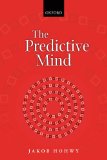November 24, 2013

The Predictive Mind by Jakob Hohwy (Oxford University Press, USA, 2013)
(paperback – 1/28/14), (amazon.co.uk – Nov 2013), (uk kindle ed.)
Book description from the publisher:
A new theory is taking hold in neuroscience. It is the theory that the brain is essentially a hypothesis-testing mechanism, one that attempts to minimise the error of its predictions about the sensory input it receives from the world. It is an attractive theory because powerful theoretical arguments support it, and yet it is at heart stunningly simple. Jakob Hohwy explains and explores this theory from the perspective of cognitive science and philosophy. The key argument throughout The Predictive Mind is that the mechanism explains the rich, deep, and multifaceted character of our conscious perception. It also gives a unified account of how perception is sculpted by attention, and how it depends on action. The mind is revealed as having a fragile and indirect relation to the world. Though we are deeply in tune with the world we are also strangely distanced from it.
The first part of the book sets out how the theory enables rich, layered perception. The theory’s probabilistic and statistical foundations are explained using examples from empirical research and analogies to different forms of inference. The second part uses the simple mechanism in an explanation of problematic cases of how we manage to represent, and sometimes misrepresent, the world in health as well as in mental illness. The third part looks into the mind, and shows how the theory accounts for attention, conscious unity, introspection, self and the privacy of our mental world.
Google Books preview:
See also: Author’s website
Comments (0)
- cognitive science,new books,philosophy of mind
November 21, 2013

Human Agency and Neural Causes: Philosophy of Action and the Neuroscience of Voluntary Agency by Jason D. Runyan (Palgrave Macmillan, 2013)
(amazon.co.uk)
Book description from the publisher:
In exploring whether our neuroscientific discoveries are consistent with the idea we are voluntary agents, Human Agency and Neural Causes presents a neuroscientifically-informed emergentist account of human agency.
In contrast with the assumptions that currently shape neuropsychological research on voluntary agency, J.D. Runyan presents a broadly-conceived Aristotelian account of voluntary agency grounded in our everyday thought about our conduct. In the process, some new concerns are raised for compatibilist theories of free will, as well as for reductive neuroscientific theory. This book argues that what contemporary neuroscience reveals is along the lines of what we should expect if we are, in fact, voluntary agents. At the same time, upholding the idea that we are voluntary agents will require profound and controversial changes in the way we interpret our neuroscientific findings.
Comments (0)
- cognitive science,new books,philosophy of mind
November 20, 2013
Book description from the publishers:
Consciousness is an enigmatic beast. It’s more than mere awareness – it’s how we experience the world, how our subjective experience relates to the objective universe around us. And therein lies the rub, in that tiny little word “how.” These kinds of questions were once the province of philosophy, religion or perhaps fantasy, but within the last few decades, neuroscientists have added a scientific voice to the discussion, using available medical technology to explore just what separates so-called “mind” from brain. How do the neural and chemical workings of our brains create our minds, our total experience of the world, our thoughts and feelings, and that sense of self that distinguishes the individual from everyone else? In this eBook, The Secrets of Consciousness, we look at what science has to say about one of humankind’s most fundamental, existential mysteries. We begin at the beginning, as they say, with Section 1 on the very nature of consciousness and move on to discuss theories of neural development. In one article, author David Chalmers calls this the “hard problem,” requiring an entirely new theory that places consciousness itself as a fundamental component akin to the forces of physics. In another, leading neuroscientists Christof Koch and Susan Greenfield debate exactly how the neurons and circuits in the brain create conscious awareness. Later sections go deeper into the rabbit hole and examine what we can learn from altered states such as hypnosis or anesthesia as well as the use of formerly blacklisted hallucinogens such as LSD as healing drugs. Gary Stix discusses one study on the possible therapeutic effects of LSD on the intense anxiety experienced by patients with life-threatening disease, such as cancer. Finally, Section 6 explores “The Enigma of Spirituality.” David Biello takes on the search in his article, “God in the Brain,” highlighting studies searching for specific neurological centers of spirituality. It’s been said before, but the brain is the final frontier. Just how that brain creates not only awareness, but also integrates that awareness into creating experiences, memories, and an enduring sense of self—well, it might take overhauling not only how we study ourselves, but how we define our reality in the process of looking.
Comments (1)
- consciousness,new books
November 19, 2013

Emotional Insight: The Epistemic Role of Emotional Experience by Michael S. Brady (Oxford University Press, USA, 2013)
(Hardcover at Amazon – 1/28/14) (amazon.co.uk – Nov 2013)
Book description from the publisher:
Michael S. Brady presents a fresh perspective on how to understand the difference that emotions can make to our lives. It is a commonplace that emotions can give us information about the world: we are told, for instance, that sometimes it is a good idea to ‘listen to our heart’ when trying to figure out what to believe. In particular, many people think that emotions can give us information about value: fear can inform us about danger, guilt about moral wrongs, pride about achievement.
But how are we to understand the positive contribution that emotions can make to our beliefs in general, and to our beliefs about value in particular? And what are the conditions in which emotions make such a contribution? Emotional Insight aims to answer these questions. In doing so it illuminates a central tenet of common-sense thinking, contributes to an on-going debate in the philosophy of emotion, and illustrates something important about the nature of emotion itself. For a central claim of the book is that we should reject the idea that emotional experiences give us information in the same way that perceptual experiences do. The book rejects, in other words, the Perceptual Model of emotion. Instead, the epistemological story that the book tells will be grounded in a novel and distinctive account of what emotions are and what emotions do. On this account, emotions help to serve our epistemic needs by capturing our attention, and by facilitating a reassessment or reappraisal of the evaluative information that emotions themselves provide. As a result, emotions can promote understanding of and insight into ourselves and our evaluative landscape.
Google Books preview:
See also: Author’s webpage
Comments (0)
- new books
November 17, 2013

Mindware: An Introduction to the Philosophy of Cognitive Science, 2nd ed., by Andy Clark (Oxford University Press, USA, 2013)
(amazon.co.uk)
Book description from the publisher:
Ranging across both standard philosophical territory and the landscape of cutting-edge cognitive science, Mindware: An Introduction to the Philosophy of Cognitive Science, Second Edition, is a vivid and engaging introduction to key issues, research, and opportunities in the field.
Starting with the vision of mindware as software and debates between realists, instrumentalists, and eliminativists, Andy Clark takes students on a no-holds-barred journey through connectionism, dynamical systems, and real-world robotics before moving on to the frontiers of cognitive technologies, enactivism, predictive coding, and the extended mind. Throughout, he highlights challenging issues in an effort to engage students in active debate. Each chapter opens with a brief sketch of a major research tradition or perspective, followed by concise critical discussions dealing with key topics and problems.
NEW TO THIS EDITION
* Three new chapters (9-11) on cognitive extensions, enactivism, and the predictive brain, and a revised appendix on consciousness
* Extensive revisions, additions, and updates throughout in light of new developments in the field
* New text boxes and revised and expanded suggestions for further reading, including many electronic resources (summarized on the book’s Companion Website at www.oup/us/clark)
See also: Companion website
Comments (0)
- cognitive science,new books,philosophy of mind






